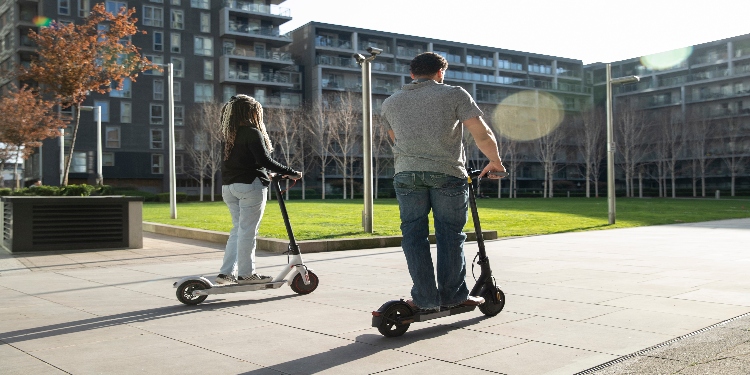In the bustling streets of 2024, a new trend is swiftly gaining momentum – the electric scooter, or e-scooter, revolution. As cities worldwide strive for greener, more sustainable transportation solutions, e-scooters are emerging as a popular choice for commuters and urban dwellers alike. With technological advancements and innovative designs, these compact vehicles are not just a mode of transportation but a statement of modern mobility.
The Rise of E-Scooters:
The journey of e-scooters began over a decade ago, with initial models facing skepticism due to concerns about safety, reliability, and regulatory issues. However, advancements in battery technology, motor efficiency, and robust design have propelled e-scooters into the mainstream. Laser247, a pioneer in e-scooter technology, has been at the forefront of this revolution, continuously pushing the boundaries of innovation.
One of the key drivers behind the surge in e-scooter popularity is their eco-friendly nature. With zero emissions and low energy consumption, they align perfectly with the global push for sustainability. Additionally, their compact size and maneuverability make them an ideal choice for navigating congested urban environments, offering a convenient last-mile solution for commuters. Betbhai9, a leading provider of micro-mobility solutions, has recognized the potential of e-scooters in addressing urban transportation challenges and has been instrumental in promoting their adoption.
Technological Innovations:
In 2024, e-scooters are not just about getting from point A to point B; they represent a fusion of cutting-edge technology and sleek design. Companies are investing heavily in research and development to enhance the user experience and address safety concerns. World777, a prominent player in the e-scooter market, has introduced groundbreaking features such as smart connectivity and enhanced safety features, setting new standards for the industry. As we look ahead to the future of e-scooters, the possibilities are limitless. Rapid advancements in battery technology, artificial intelligence, and materials science are poised to further revolutionize the industry. The collaboration between e-scooter companies, regulatory authorities, and technology providers will be crucial in shaping a sustainable and efficient urban mobility ecosystem.
- Smart Connectivity: Many e-scooter models now come equipped with built-in GPS and smartphone connectivity. Riders can locate nearby scooters, unlock them with a simple tap on their phone, and track their route in real-time. This connectivity also enables fleet management for companies, ensuring efficient deployment and maintenance.
- Enhanced Safety Features: Safety remains a top priority for e-scooter manufacturers. Advanced braking systems, integrated lights for improved visibility, and anti-theft mechanisms are becoming standard features. Some models even incorporate collision detection sensors and automatic speed adjustment to prevent accidents.
- Long-Lasting Batteries: Range anxiety is a thing of the past with the latest generation of e-scooters. Lithium-ion batteries with extended battery life allow riders to travel longer distances on a single charge, making them a viable option for daily commutes.
- Foldable Designs: Portability is another key focus area for e-scooter designers. Foldable models with compact dimensions are easy to carry and store, catering to commuters who need to combine multiple modes of transportation.
Regulatory Landscape:
While the popularity of e-scooters continues to soar, the regulatory landscape remains a complex terrain. Cities worldwide are grappling with issues such as sidewalk clutter, pedestrian safety, and parking regulations. However, proactive measures are being taken to integrate e-scooters into existing transportation frameworks.
- Pilot Programs: Many cities have initiated pilot programs to assess the impact of e-scooters on traffic patterns, safety, and public perception. These programs allow authorities to gather data and formulate regulations tailored to local needs.
- Dedicated Infrastructure: To accommodate the growing number of e-scooter riders, cities are investing in dedicated lanes and parking spaces. This not only enhances safety but also encourages more people to embrace micro-mobility solutions.
- Collaborative Partnerships: E-scooter companies are collaborating with local governments and transportation agencies to establish guidelines for operation. By fostering open communication and sharing data, these partnerships aim to create a sustainable ecosystem for micro-mobility.
The Future Outlook:
As we look ahead to the future of e-scooters, the possibilities are limitless. Rapid advancements in battery technology, artificial intelligence, and materials science are poised to further revolutionize the industry.
- Autonomous E-Scooters: The concept of autonomous e-scooters is already on the horizon. By integrating sensors and AI algorithms, these scooters can navigate city streets autonomously, offering a glimpse into the future of urban transportation.
- Multi-Modal Integration: E-scooters are just one piece of the larger puzzle of multi-modal transportation. In the coming years, we can expect seamless integration between e-scooters, public transit, ride-sharing services, and cycling infrastructure, providing commuters with a range of options to choose from.
- Sustainability Initiatives: E-scooter companies are doubling down on their commitment to sustainability. From using recycled materials in manufacturing to implementing carbon offset programs, these initiatives are aimed at reducing the environmental footprint of e-scooters and promoting a greener future.
- Personalization and Customization: In addition to technological advancements, e-scooter manufacturers are focusing on personalization and customization options. Riders can now choose from a variety of colors, designs, and accessories to tailor their e-scooter to their preferences. From custom paint jobs to ergonomic handlebar grips, these options not only enhance the aesthetic appeal but also cater to individual comfort and style.
- Health and Wellness Benefits: Beyond the convenience of getting around town, e-scooters offer numerous health and wellness benefits. Riding an e-scooter is a form of low-impact exercise that promotes cardiovascular health and strengthens core muscles. It also provides an opportunity to enjoy the outdoors and soak in the sights and sounds of the city, contributing to overall well-being and mental relaxation.
As e-scooters continue to evolve and integrate into the fabric of urban life, these additional dimensions of personalization and health benefits further underscore their significance as a transformative mode of transportation in 2024 and beyond.
Conclusion:
In conclusion, the evolution of e-scooters in 2024 is a testament to the power of innovation and sustainability. With technological advancements, enhanced safety features, and proactive regulatory measures, e-scooters are reshaping urban transportation and paving the way for a cleaner, more efficient future. As we embrace this revolution, let us continue to prioritize safety, sustainability, and accessibility, ensuring that e-scooters remain a catalyst for positive change in our cities.


![7 Best POS Software in the UK [2026 Edition]](https://todaynews.co.uk/wp-content/uploads/2026/02/7-Best-POS-Software-in-the-UK-2026-Edition-360x180.png)








































































